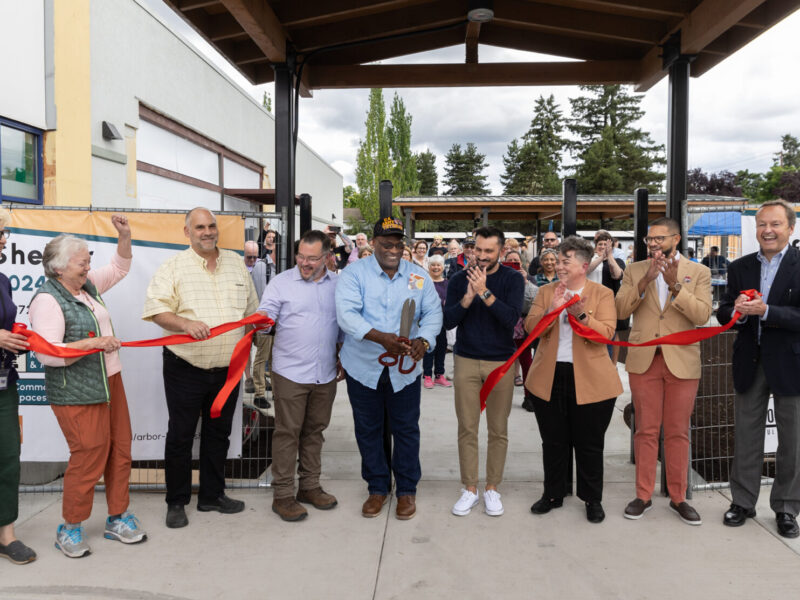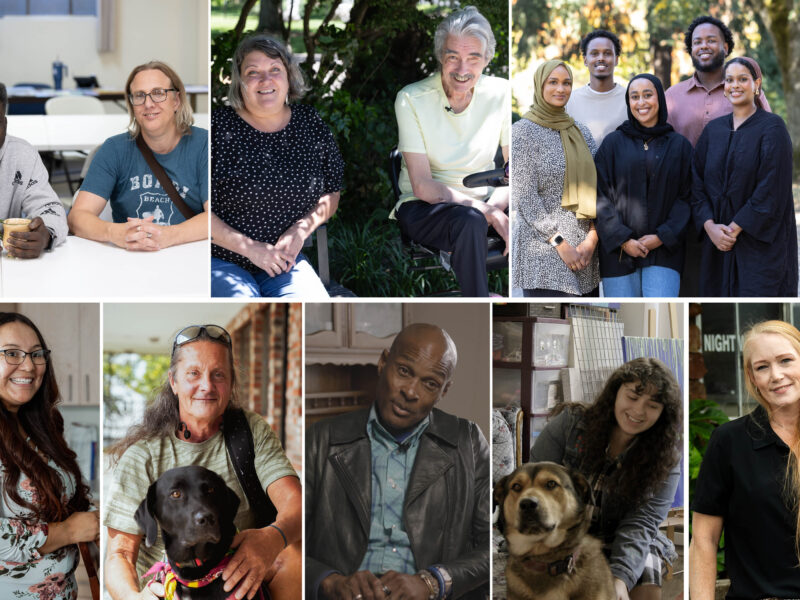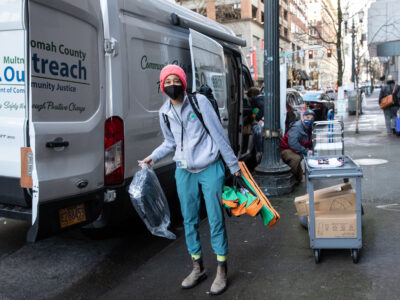Who We Are
About the Homeless Services Department
First established in 2016, the Joint Office of Homeless Services — a shared commitment between Multnomah County and the City of Portland — was created to oversee the delivery of services to people experiencing homelessness across Multnomah County through housing assistance, shelter, outreach, case management and other services.
Then in 2020, Metro voters passed the Supportive Housing Services Measure, which led to the Joint Office expanding significantly in 2021. Fast forward to 2024 where County and City leaders formed the Homelessness Response Action Plan to create new governance and accountability structures with specific; achievable outcomes, the Joint Office then transformed into its own formal department within the County now known as the Homeless Services Department.
Mission
The HSD works with community organizations and government entities to provide coordinated, participant-driven, and equitable services for people experiencing or at risk of homelessness.

Vision and Values
Vision
The HSD seeks to create an equitable community in which all people have safe, affordable, and accessible housing.
Values
Our guiding values are collaboration, equity, inclusion, integrity, creativity and quality.
- Collaboration: We recognize our interdependence as individuals and as an organization, and approach our work with a spirit of partnership and shared power with those experiencing homelessness and other stakeholders.
- Equity: We commit to achieving equity for all individuals. We acknowledge the existence of structural racism and develop, implement, and evaluate policies and practices that achieve equitable outcomes with a focus on eliminating the disparities that people of color experience. We believe that focusing on racial equity will allow us to more effectively serve all communities.
- Inclusion: We foster within our office and within the community that we serve a culture of safety and belonging that ensures that the voices of people who have been historically excluded, including people of color, women, people with disabilities and LGBTQIA2S+ people, are truly heard and shape the direction of our work.
- Integrity: We strive to be humble, honest and fair in our roles, function and actions. We are open and accountable to each other and to the community that we serve. We encourage asking and answering tough questions or having difficult conversations.
- Creativity: We are always open to approaching problems and solutions in new ways, taking calculated risks, and testing innovative ideas. We recognize the importance of not letting the possibility of failure dissuade us from experimenting with promising new ways of doing things. We realize that sometimes our current policies and practices pose barriers to change and improvement.
- Quality: We commit to doing the highest quality work, and to continuously evaluating and improving our internal operations, contracting and community planning efforts. We recognize that it is our responsibility to be good stewards of the public resources entrusted to us and to ensure that those resources achieve the best possible outcomes for our community.
Our Commitment to
Equity
Racist practices, policies and beliefs in the systems surrounding us are among the primary drivers of homelessness among Black, Indigenous and people of color (BIPOC). To achieve our vision of a community where everyone has a place to call home, we must focus on racial equity.
We’re expanding culturally-specific provider investments to engage BIPOC communities in our planning work. Our data work includes demographics to ensure we’re meeting our goals, and we invest in frontline organizations engaged in effective culturally responsive services and support frontline workers across all organizations, who are disproportionately BIPOC.
Equity Statement
We commit to achieving equity for all individuals. We acknowledge the existence of structural racism and develop, implement and evaluate policies and practices that achieve equitable outcomes with a focus on eliminating the disparities that people of color experience. We believe that focusing on racial equity allows us to more effectively serve all communities.
Learn about how our commitment to equity informs our approach to solving the homelessness crisis in our community.
Equity Advisory Committee
The HSD Equity Advisory Committee is a standing committee that helps guide the work of the Homeless Services Department. The Committee has no legal responsibilities and is free to advise on best practices. Its role is to provide the HSD with guidance and recommendations on ways to address ongoing and systemic racial disparities.
Lived Experience Advisory Committee
A core value of the HSD is to engage community voices — in particular those with lived experience of homelessness. The Lived Experience Advisory Committee, made up of people who have experienced homelessness, provides insight and recommendations to the HSD to help inform and improve our services and programs. Committee meetings are public. If you’d like to attend a meeting, see our news for meeting dates.

What We Do
The HSD contracts with direct service organizations, monitors funds issued by the U.S. Department of HUD’s Continuum of Care Program, conducts homeless street counts, manages systems of care, and oversees system reporting and evaluation.
The HSD also is responsible for:
- Overseeing the development and operations of the shelter system,
- Leading the County’s implementation of the Metro Supportive Housing Services Measure of 2020 and of the Homelessness Response Action Plan of 2024, and
- Developing policies and programs through community engagement and involvement to help address and solve homelessness
The HSD does not enforce municipal codes, address criminal activity, or provide direct services.
Services We Fund
 Housing
Housing Placement and retention support for community members to move from homelessness into housing, including supportive services, as needed, to ensure long-term retention. Eviction prevention support helps households at risk of homelessness retain their housing.
 Outreach
Outreach Connecting individuals and families experiencing homelessness with housing and support services including addressing basic needs, mental health support, substance use screening and assessment, culturally-specific outreach, and housing readiness assistance.
 Shelters
Shelters Providing a range of types of shelters for all populations served, we strategically invest by purchasing, developing, and operating emergency shelters that offer safety off the streets. These shelters are located, designed, and supported to maximize transitions of participants back into permanent housing.
 Data and Analytics
Data and Analytics We use data to improve the services we provide through the annual Point-in-Time count, a by-name list using the Homeless Management Information System (HMIS), and analytics for effective coordination of services and resources.





